![]()
![]()
Their fear of items being stolen, or not being returned, was considered preposterous. When the Honorable Adviser and his excellency the Charge d’Affaires had themselves, guaranteed the safety of Bangladesh’s most prized artefacts, surely the protesters could have no reason to oppose this arrangement. News of the missing crate, and the priceless statues it contained, had been suppressed, but the information leaked out. Could the guarantors please explain?
Mr. Jean Romnicianu, Charges d’Affaires, Ambassade de France ? Dacca, met with Bangladeshi journalists at the French Embassy in the first week of December 2007. In response to questions about the possibility of goods being damaged, stolen, or not being returned, he stated emphatically, “What I am saying is that for at least 30 years, it has never, not once, happened within the framework of an international exhibition. This is an international exhibition with a signed agreement between governments, there is no scope whatsoever of that kind of thing.” “We will take care of the artefacts, until they are returned to the museum. All the insurance and everything is what is called nail to nail,” elaborating that it implied protection from the moment the artefacts left their original position in the museum, to the time it was returned to their original position.
guimet-nail-to-nail.mp3
Today we hear him on television saying “The responsibility of the French Goverment begins from the point where the items are in French cargo.”
“We are not going to put the artefacts at risk by unpacking them,” was also something the Charge d’Affaires had said that day. Today (Dec 24th 2007), the BBC quoted that the remaining crates had all been checked at the airport. So airport officials who have no knowledge of archaeology are permitted to open the crates, while neither members of the expert committee nor the people who are legally required to inspect the artefacts, are allowed to do so. These officials had also signed documents stating they had verified the contents of the crates, which they had obviously not been allowed to do, even though it made the documents presented, technically false.
“The Museee Guimet and our authorities in France have worked rather hard, I must say, even though it resulted in one mistake, in keeping all the controversies outside of the French papers, of the European papers,” the Charge d’Affaires had also said that day. So the cover up was taking place at both the Bangladeshi and the French end. Presumably it continues.
french-statement-on-media-blockage.mp3
(Audio recordings of these statements are available and will be uploaded as soon as they have been digitised)
——–
 The plane that was meant to have taken the artefacts to Paris. ? Munir uz Zaman/DrikNews
The plane that was meant to have taken the artefacts to Paris. ? Munir uz Zaman/DrikNews
 From Pukur Churi (stealing a pond) to Pukur Pare Churi (stealing by a pond). Search party looking for stolen artefacts by the pond at Zia International Airport. ? Munir uz Zaman/DrikNews
From Pukur Churi (stealing a pond) to Pukur Pare Churi (stealing by a pond). Search party looking for stolen artefacts by the pond at Zia International Airport. ? Munir uz Zaman/DrikNews
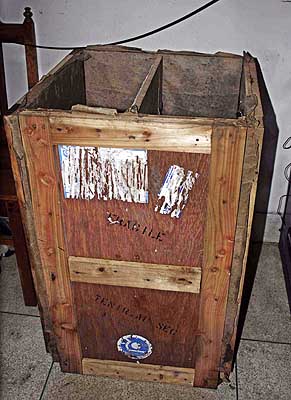 The empty crate. We had been told these were special crates that could not be opened, as they were very special. A 300 year old French company had been especially commissioned to pack the crates. The government and the French embassy decided to show improper documents rather than risk opening these special crates for proper inspection and documentation. Looks like a pretty ordinary crate to me. ? Munir uz Zaman/DrikNews
The empty crate. We had been told these were special crates that could not be opened, as they were very special. A 300 year old French company had been especially commissioned to pack the crates. The government and the French embassy decided to show improper documents rather than risk opening these special crates for proper inspection and documentation. Looks like a pretty ordinary crate to me. ? Munir uz Zaman/DrikNews
 This was a story the state owned BTV had chosen to completely ignore. The rest of the media however, despite government efforts continued to report this important story. Despite the widespread protests and the media attention, the shipment was to go ahead. Both the Cultural Adviser and the French Charge d’Affaires, emphatically promised there was no question of items going missing or not being returned. ? Munir uz Zaman/DrikNews
This was a story the state owned BTV had chosen to completely ignore. The rest of the media however, despite government efforts continued to report this important story. Despite the widespread protests and the media attention, the shipment was to go ahead. Both the Cultural Adviser and the French Charge d’Affaires, emphatically promised there was no question of items going missing or not being returned. ? Munir uz Zaman/DrikNews
b035.mp3 Interview of police officer after discovery of crate (Bangla). Munir uz Zaman/DrikNews
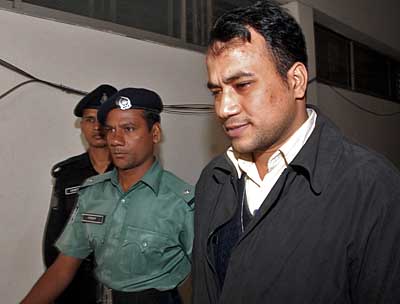 One of the arrested security officers. What of the big fish that masterminded this theft? Or the people who authorised this shipment despite the proven irregularities? ? Munir uz Zaman/DrikNews
One of the arrested security officers. What of the big fish that masterminded this theft? Or the people who authorised this shipment despite the proven irregularities? ? Munir uz Zaman/DrikNews
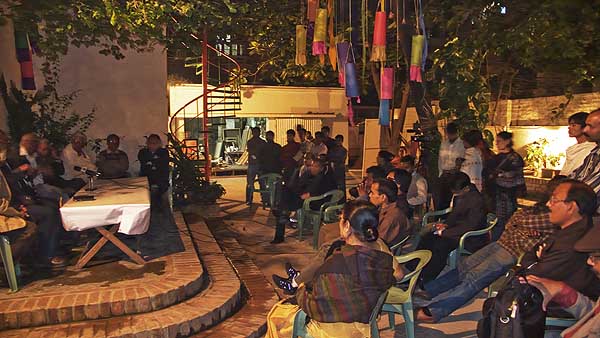 Press conference at Chitrak Gallery, where the incident has been called the most major cultural disaster of the century. ? Shahidul Alam/Drik/Majority World
Press conference at Chitrak Gallery, where the incident has been called the most major cultural disaster of the century. ? Shahidul Alam/Drik/Majority World
——–
It was the letter from Shanika, the girl I had found during the Tsunami in Sri Lanka, that reminded me of how we had forgotten all the other things that were going on. It was now Boxing Day. The Day the Tsunami had struck. Bodies are still being discovered after the Sidr cyclone. Demand for the trial of war criminals has moved off the headlines. Bodies of workers remain buried in the Rangs building rubble. It reminds me of how classed our struggles are. While we had united in protest when our archaeological heritage was being threatened, no such protest had taken place in solidarity with the workers.
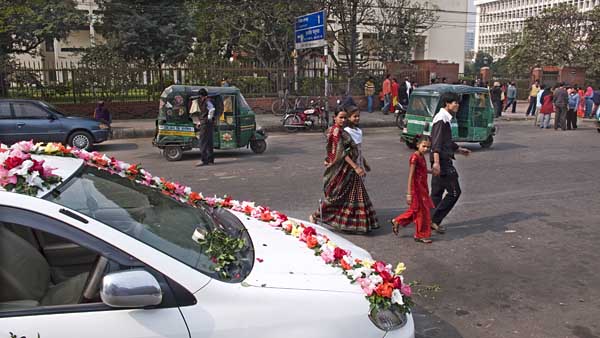 It was Christmas day, and it is the wedding season in Bangladesh. People had gathered outside the musuem, as word had spread that the remaining artefacts were being returned. It was a very different mood, and the local flower shop was using the wide road to decorate a wedding car. ? Shahidul Alam/Drik/Majority World
It was Christmas day, and it is the wedding season in Bangladesh. People had gathered outside the musuem, as word had spread that the remaining artefacts were being returned. It was a very different mood, and the local flower shop was using the wide road to decorate a wedding car. ? Shahidul Alam/Drik/Majority World
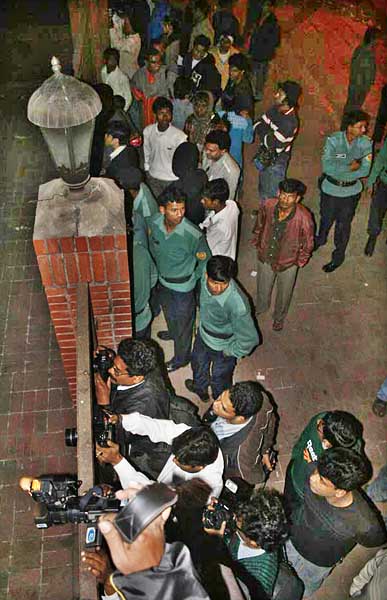 Media professionals outside museum gate watching the return of remaining 12 crates. ? Munir uz Zaman/DrikNews
Media professionals outside museum gate watching the return of remaining 12 crates. ? Munir uz Zaman/DrikNews
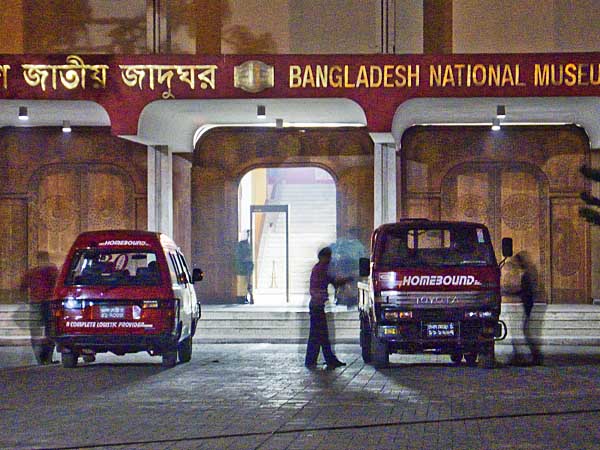 Homebound heading home. The crates are now back in the museum. The demand for reinstating them in their original location continues. ? Shahidul Alam/Drik/Majority World
Homebound heading home. The crates are now back in the museum. The demand for reinstating them in their original location continues. ? Shahidul Alam/Drik/Majority World
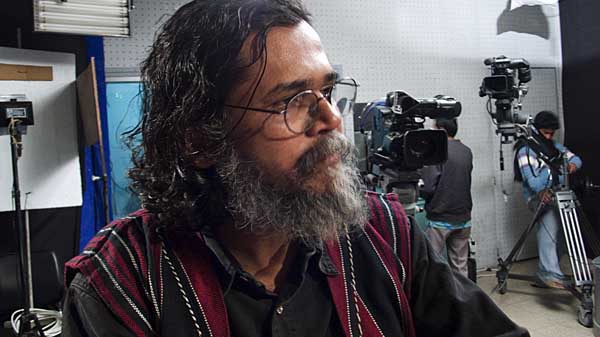 It was the vigilance of Nisar Hossain (teacher at the college of fine arts, affectionately dubbed, ‘Sector Commander’ by fellow campaigners) and his friends that led to many of the irregularities being unearthed. Nisar being interviewed on the ATN channel. ? Shahidul Alam/Drik/Majority World
It was the vigilance of Nisar Hossain (teacher at the college of fine arts, affectionately dubbed, ‘Sector Commander’ by fellow campaigners) and his friends that led to many of the irregularities being unearthed. Nisar being interviewed on the ATN channel. ? Shahidul Alam/Drik/Majority World
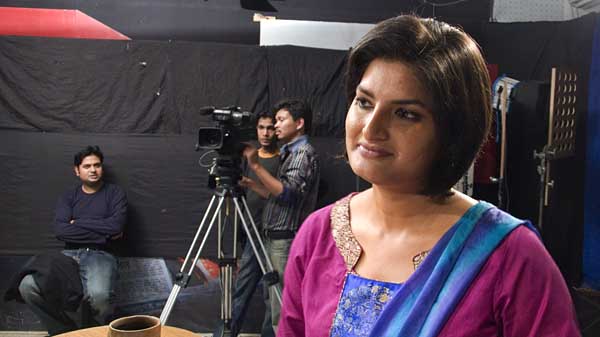 The media played an important role in keeping the issue in the public eye. Munni Saha interviewing Nisar Hossain for a programme in the ATN channel. The discussions included a clear condemnation of the French Charge d’Affaires’ statement blaming the protestors for the theft. The programme will air at 11:00 am Dhaka time on the 26th December 2007. ? Shahidul Alam/Drik/Majority World
The media played an important role in keeping the issue in the public eye. Munni Saha interviewing Nisar Hossain for a programme in the ATN channel. The discussions included a clear condemnation of the French Charge d’Affaires’ statement blaming the protestors for the theft. The programme will air at 11:00 am Dhaka time on the 26th December 2007. ? Shahidul Alam/Drik/Majority World
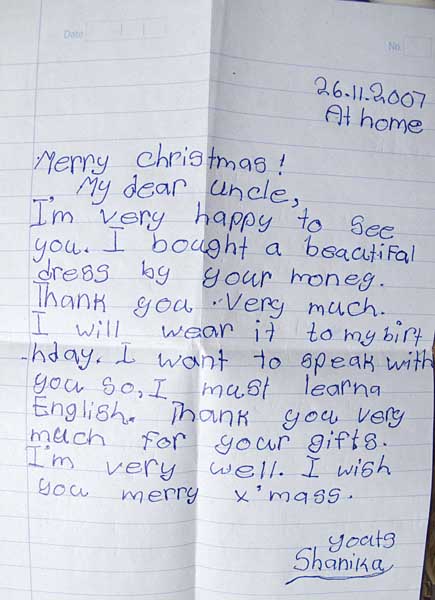 Letter from Shanika, received earlier in the month.
Letter from Shanika, received earlier in the month.
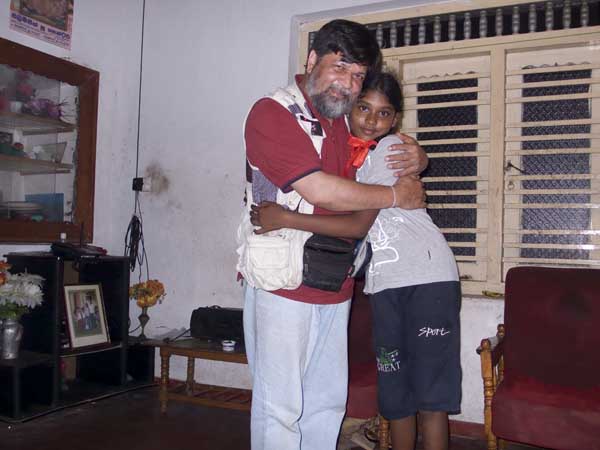 During an assignment for Help The Aged in Sri Lanka last month, I had sneaked a visit to Totagumuwa, in Hikkaduwa to see Shanika. The Tsunami had taken away her mother and her three sisters (including her twin sister). Photo: ? Priantha (Shanika’s dad).
During an assignment for Help The Aged in Sri Lanka last month, I had sneaked a visit to Totagumuwa, in Hikkaduwa to see Shanika. The Tsunami had taken away her mother and her three sisters (including her twin sister). Photo: ? Priantha (Shanika’s dad).
——-
27th December 2007
Sylvie Rebbot, the picture editor of Geo Magazine in France, just sent me this press release last night. It was issued yesterday (the 26th December 2007) by the French Ministry of Culture. While it talks about the theft of the two statues, from Zia International Airport, there is no mention of the 10 crates that are already in Paris at the Guimet Museum.
Press Release by French Ministry of Culture (26th Dec 2007)
261207-cp-expo-musee-guimet.pdf
Tag: Governance
A Flag Fails to Flutter
![]()
It was a bad day for cows
 Korbani meat being distributed outside National Museum during Eid. 21st December 2007. ? Shahidul Alam/Drik/Majority World
Korbani meat being distributed outside National Museum during Eid. 21st December 2007. ? Shahidul Alam/Drik/Majority World
But the Bangladesh government had a supreme sacrifice in mind. When the most prized of your possessions needed to be sacrificed, and when the gods have changed to western powers, the four-legged creatures simply wouldn't do. The nation's most prized archaeological possessions were therefore bundled away in Homebound chariots to distant museums. The door to heaven's gate might not have opened, but a Schengen visa and perhaps a few trips to Paris for some, had surely been assured.
It was well timed. The Eid holidays meant there would be no newspapers for two days. Most reporters would be away. The streets of Dhaka would be empty. Holidays meant there was no rush. No pesky public to worry about at opening hours. Still one needed to be sure. Bus no Dhaka Jo 11 1767, was on standby with riot police. The police jeep Dhaka Jo 11 4364 followed behind. Then the media that got in the way. With so many Eid events to cover, why had they gathered round the national museum? The sanctity of sacrifice should surely have been respected. Reinforcements in the form of another busload of riot police came in via bus number Dhaka Jo 14 1799.
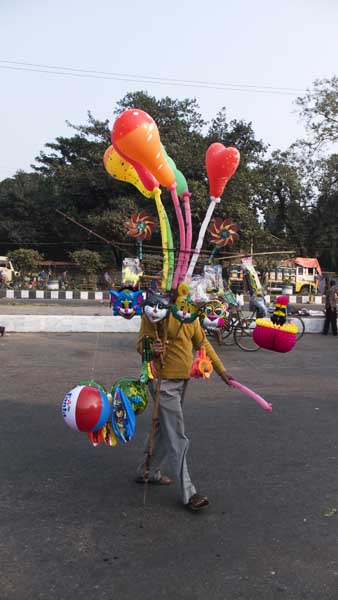 Balloon man outside National Museum. Friday 21st December 2007. ? Shahidul Alam/Drik/Majority World
Balloon man outside National Museum. Friday 21st December 2007. ? Shahidul Alam/Drik/Majority World
 Family out on Eid. Friday 21st December 2007. ? Shahidul Alam/Drik/Majority World
Family out on Eid. Friday 21st December 2007. ? Shahidul Alam/Drik/Majority World
 Aisha outside National Museum. ? Shahidul Alam/Drik/Majority World
Aisha outside National Museum. ? Shahidul Alam/Drik/Majority World
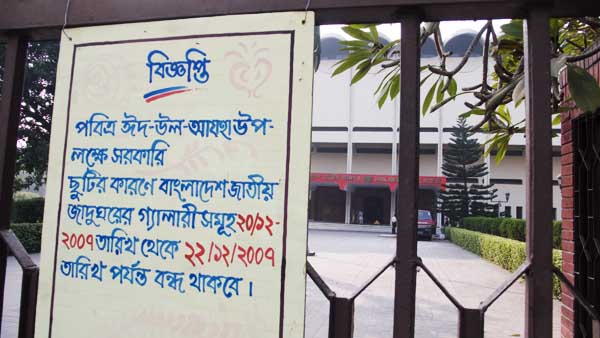 Sign says the museum is closed from the 20th till the 22nd on account of Eid. Friday 21st December 2007. ? Shahidul Alam/Drik/Majority World
Sign says the museum is closed from the 20th till the 22nd on account of Eid. Friday 21st December 2007. ? Shahidul Alam/Drik/Majority World
Aisha had come with her parents to visit the museum. Like many others they were turned away. The museum was closed, at least to the public. The Eid holidays of museum officials had however been cancelled. The shippers were working overtime.
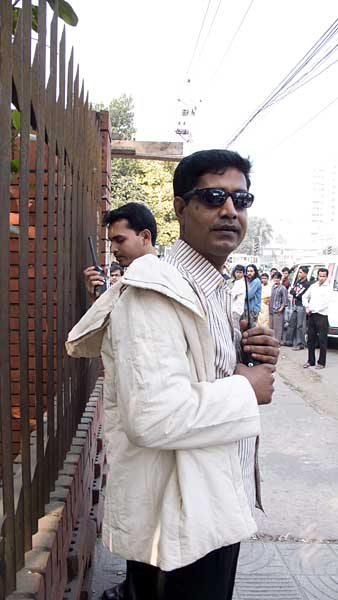
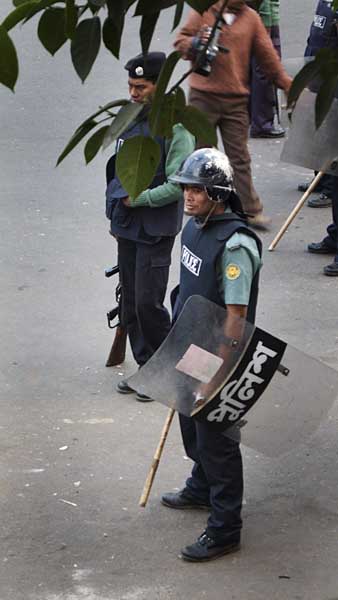
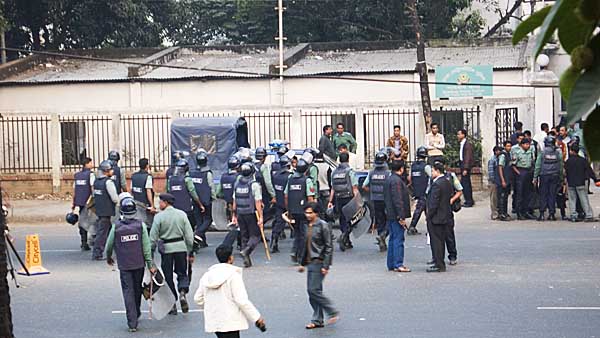 Police returning to station, after staging the 'escape'. ? Shahidul Alam/Drik/Majority World
Police returning to station, after staging the 'escape'. ? Shahidul Alam/Drik/Majority World
Police and plainclothes intelligence officials were present in abundance, their riot gear jarring with the bright new clothes of Dhakaites. Then it took another turn. Spitting and booing had failed to stop the Homebound trucks earlier. This time the protesters changed tack. Chains were put on the gate of the national museum. Visions of the Chipko Resistance
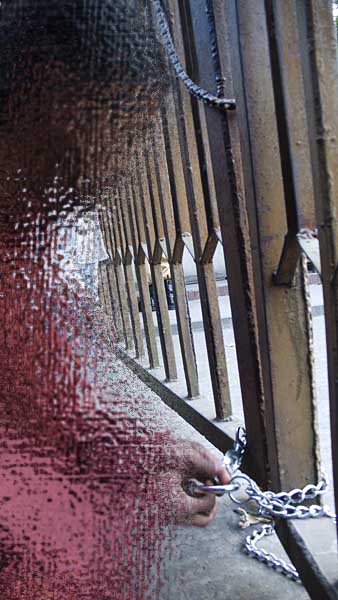 Protester chaining front gate of National Museum. Friday 21st December 2007. ? Shahidul Alam/Drik/Majority World
Protester chaining front gate of National Museum. Friday 21st December 2007. ? Shahidul Alam/Drik/Majority World
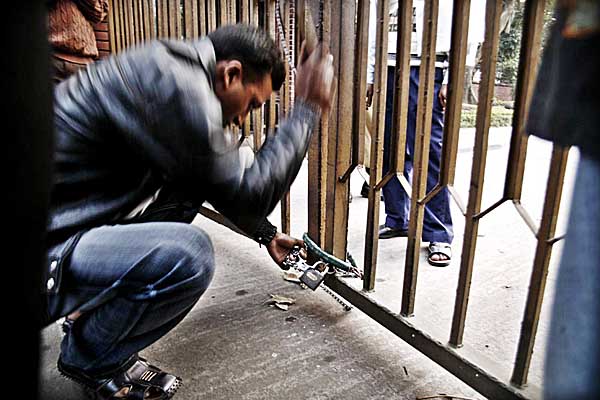 Police breaking padlock at front gate of National Museum. Friday 21st December 2007. ? Gazi Nafis Ahmed/DrikNews
Police breaking padlock at front gate of National Museum. Friday 21st December 2007. ? Gazi Nafis Ahmed/DrikNews
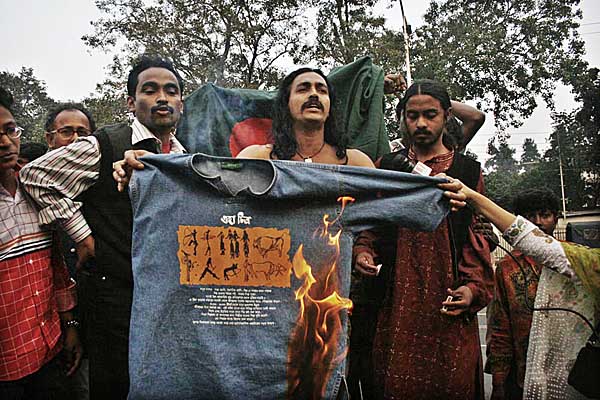 Burning shirt in protest outside National Musuem. Friday 21st December 2007. ? Munir uz Zaman/DrikNews
Burning shirt in protest outside National Musuem. Friday 21st December 2007. ? Munir uz Zaman/DrikNews
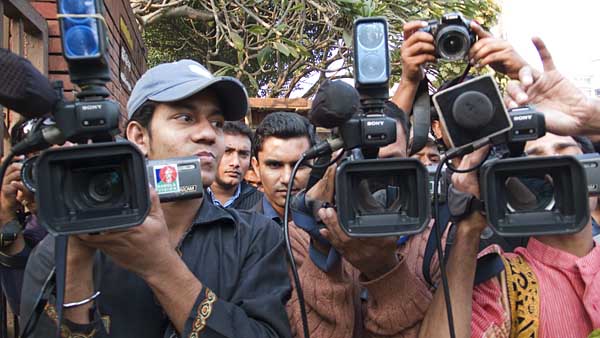 Despite emergency rule and government efforts to bury the story, media continued to give the event full coverage. ? Shahidul Alam/Drik/Majority World
Despite emergency rule and government efforts to bury the story, media continued to give the event full coverage. ? Shahidul Alam/Drik/Majority World
sprang to mind. In place of burglars breaking in, the comic view of government officials breaking their way out of the national museum to escape with museum valuables would have brought laughter in a trirotno drama (popular Bangladeshi sitcom). In the theatre of Bangladeshi governance, it was yet another tragedy.
"The benefits, for both countries, are cultural: it is a win-win situation where France gains a better knowledge of Bangladeshi heritage and Bangladesh gains a better image on the international cultural scene," the French embassy handout had clarified.
The partially demolished Rangs building continues to be a grave for the buried Bangladeshi workers far down the priority chain. Presumably, that is a 'Bangladeshi heritage' the Parisians will not get to see.
The last time round, they had been playing one of my favourite Bhupen Hajarika songs. This time there was no music, and no one was smiling. Even the Bangladeshi flag failed to flutter on this Eid day. Video of trucks carrying artefacs out of museum. ? Shahidul Alam/Drik/Majority World
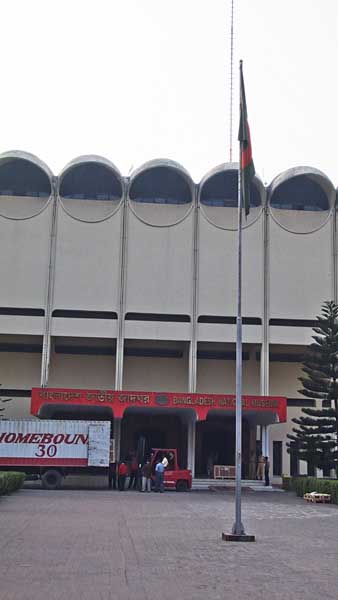 embed> Bangladeshi flag refuses to flutter as prized Bangladeshi objects are taken out of museum. ? Shahidul Alam/Drik/Majority World
embed> Bangladeshi flag refuses to flutter as prized Bangladeshi objects are taken out of museum. ? Shahidul Alam/Drik/Majority World
Video of trucks carrying artefacs out of museum.
It Should Not Have Happened
![]()
Why should the poor always have to pay for the misdeeds of the government, of the rich?
This question surfaced yet again when I stood outside Rangs building on the morning of Dec 12.
Rangs, one of the largest business houses in Bangladesh, had their building plans approved by Rajuk (Rajdhani Unnoyon Kortripokkho, i.e., Capital Development Authority), and they built a huge edifice. Approval for high rises are generally not given in this area due to flight restrictions. Six storied buildings are the limit. However, Rangs built a 22 storied building which no one could miss. Except Rajuk, of course.
That is how things stood until the present caretaker government came into power and rushed headlong into its drive against corruption.
? Which officials in Rajuk had okayed these plans? And why? That has remained a secret. Has anyone in Rajuk been punished for approving these plans?
? The Supreme Court ordered the demolition of the building, and Rajuk appointed Six Star, a ship-breaking company to carry out the work. Who made the decision? On what basis? What qualifications did Six Star have? Was any corruption involved? If so, will those involved be tried?
? After the demolition disaster, Six Star, Rajuk, Rangs — will they be made accountable for their misdeeds?
Is a life worth only one lakh taka — the sum that the government will pay as compensation for those who have died?
‘They don’t give us our dead’
An elderly man sat 50 feet away from the Rangs building on a second floor veranda of a shopping market. After the innards of the building had collapsed, many workers had taken shelter in this veranda. The elderly man had come to Dhaka early this morning with his son-in-law, in search of his son’s body. He muttered something when I asked him if he had spoken to anyone here. I couldn’t make sense, and repeated my question. I could barely make out what he said, “They don’t give us our dead.” He told me he had come from Gaibandha, and I thought to myself, now we can be sure that one of those who have died is from Gaibandha.
A woman has rushed over from Modhukhali. Her brother has suffered a head injury. But thankfully, he is alive, and he will live. At least ten people from Modhukhali are thought to have died in the demolition disaster.
Hajari, one of the workers hired for demolition said, one of the building’s security men is missing. He had last been seen on one of the topmost floors of the building. “It all happened in less than 30 seconds.” Hajari and the other workers had scrambled down the floors to save themselves.
I spoke to some of the workers and it seemed that no one from Rajuk or Six Star, at least not any one in a position of authority had contacted them, or spoken to them, let alone reassured them. Class distances are such that the workers themselves had not gathered the courage to talk to Rajuk officials.
Six Star company, Hajari told me, had brought the main group of workers from Chittagong. Being a port city, Chittagong is a place where people from different parts of the country migrate to in search of work. Hajari’s home is Barisal but he has lived for many years in Chitagong. “Six Star,” he said, “they will provide compensation. They are ever-ready. In Chittagong dock, every month you get to see one or two workers die, such accidents keep happening.” Most of those who had survived the Rangs disaster had been sent back by Six Star. Only 50 workers had been kept back for the rescue effort.
Six Star was paying the workers daily wages and also providing meal charges. From tonight (Dec 12) , the company would also arrange workers’ boarding. This is what Hajari had told me but when I spoke to two other workers, they said they were not being paid their regular wages. Neither were labour shordars giving them money to buy food.
On the market verandah I came across another worker, who was released yesterday from Dhaka Medical College. He had received back injuries, so said the hospital slip. He did not have the money to buy the medicine that had been prescribed. Painkillers on an empty stomach would do him more harm than good. He told me that he had slept on a thin sheet of cloth the night before, and that his pain had increased.
An old story of anguish and suffering
As we talked with the workers and their relatives, I noticed an elderly, bearded man speaking nearby. He was noticeably agitated. I took him to be a demolition worker. I moved closer to where he stood and heard him say, “If they had been the sons of MPs and Ministers, would the dead bodies have been left hanging? People would have been running around breathlessly. We are cchotolok, why should anyone bother?” I later found out that he didn’t work for Rangs, that he worked somewhere else nearby. Listening to him was like listening to a broken record. I was reminded yet again of how helpless poor people are.
It should not have happened. It should not have been allowed to happen. It is something that should have caused a government’s downfall. It is amazing that such things keep happening. Almost daily. And ceaselessly.
Newspaper reporting
At home, we read Prothom Alo. In terms of reporting, it is one of the finest newspapers in the country. I quickly skimmed the reportage on Rangs, once again today. None of the reports focus on who is to blame for the disaster, they tend to highlight the accident-al nature of the disaster. I see an editorial, but I do not have the time to read it. Those who read other newspapers will know how it has been reported in other dailies. Some may cite cyclone Sidr, or the harassment of university teachers as reasons for such reporting but I find it difficult to agree. I think the un-focused reporting is deliberate.
But I must not be too harsh. After all, it is news reporters who keep the story alive as those who are guilty hide behind screens of authority.
People’s distrust
Tonight I have learnt that 14 coffins have been taken inside. Since then, family members of the workers have refused to leave the area. Many of them think that the authorities will get rid of the bodies. They have come from outside Dhaka, they do not belong here, they have no networks of familial or social support in this city. They can only gather and resist with whatever they have.
Will the authorities really get rid of the dead bodies? Will they not hand over to grieving family members the bodies of their beloved ones? You may think I am jumping to conclusions but it is true that the whole process is shrouded in secrecy, and that those in authority are trying to save their skin.
Yesterday afternoon as I stood outside Rangs Bhaban, I could catch the faint smell of decomposing bodies. The smell will get stronger. Fire Brigade workers, who are on standby, do not know when rescue efforts will begin.
I belong to the ranks of the ordinary people, I belong to those who are toothless and clawless. Yet I cannot help but think, those who are guilty must not be allowed to get away. At least, not this time.
Priscilla Raj
1:00 am
Dec 13, 2007
[translation: rahnuma ahmed]
Bangladeshi journalists Priscilla Raj and Saleem Samad, who had worked for the Channel 4 team as interpreter and fixer, respectively, were also detained and charged with involvement in ?anti-state activities.? Raj was released on bail in December 2002.
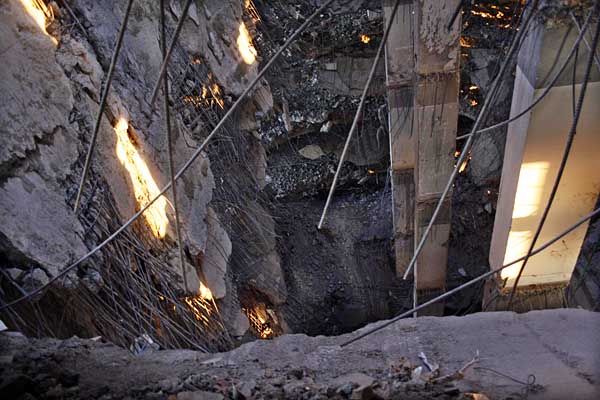 Collapsed floor of Rangs Building. December 9. 2007 ? Munir uz Zaman/DrikNews
Collapsed floor of Rangs Building. December 9. 2007 ? Munir uz Zaman/DrikNews
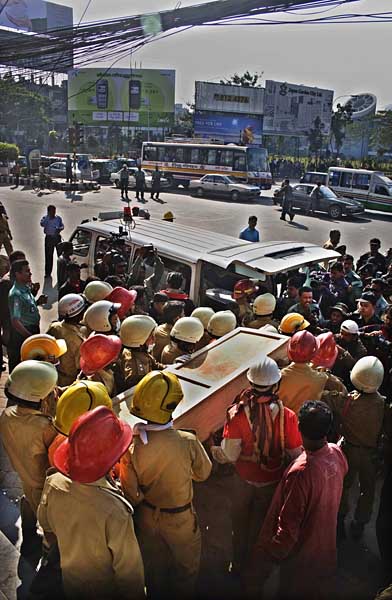 Body released by Fire Brigade being sent to morgue. ? Azizur Rahim Peu/DrikNews
Body released by Fire Brigade being sent to morgue. ? Azizur Rahim Peu/DrikNews
We rushed as soon as we received the tip off, sneaking away from our workshop on “Investigative Journalism for Television.” Working our way round the devotees praying on Panthapath we rushed to the National Museum.
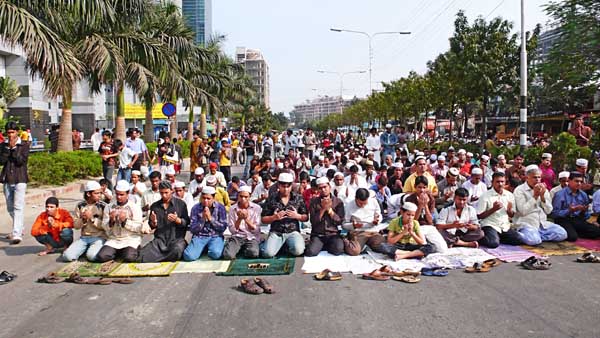 Jumma prayers on Panthapath. Friday December 7. 2007. ? Shahidul Alam/Drik/Majority World
Jumma prayers on Panthapath. Friday December 7. 2007. ? Shahidul Alam/Drik/Majority World
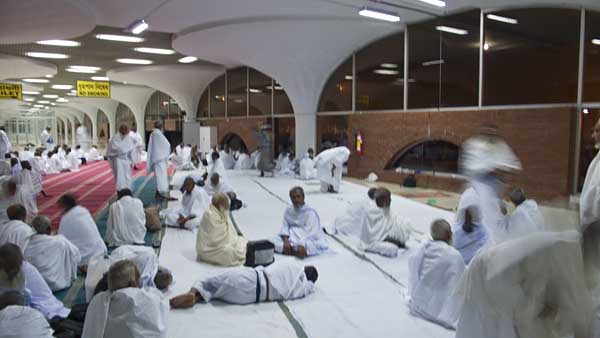 Hajis at Zia International Airport. Saturday December 8. 2007. ? Shahidul Alam/Drik/Majority World
Hajis at Zia International Airport. Saturday December 8. 2007. ? Shahidul Alam/Drik/Majority World
It was a false alarm. The trucks had left, and the artefacts that were still left in the National Museum were safe. At least for the moment. The remaining week, my book launch in Glasgow,
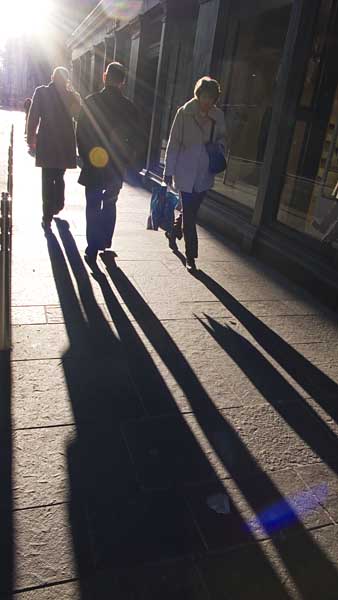 Glasgow. December 10 2007. ? Shahidul Alam/Drik/Majority World
Glasgow. December 10 2007. ? Shahidul Alam/Drik/Majority World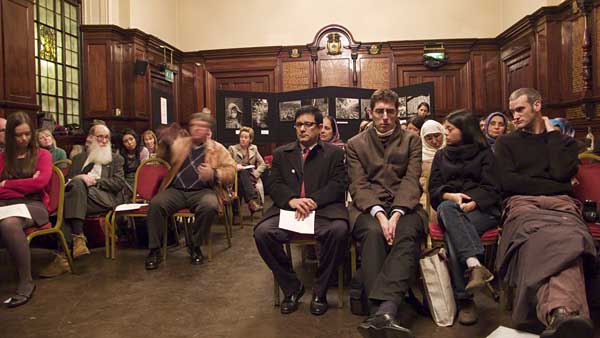 Glasgow. December 10 2007. ? Shahidul Alam/Drik/Majority World
Glasgow. December 10 2007. ? Shahidul Alam/Drik/Majority World
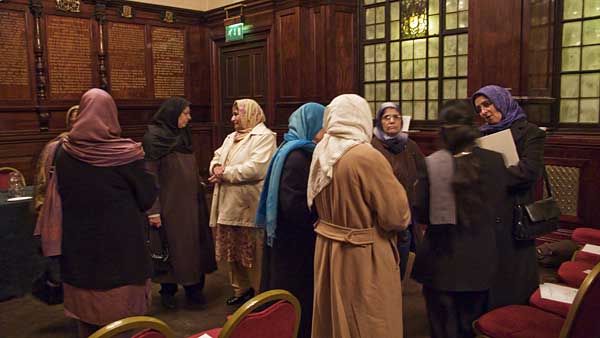 Glasgow. December 10 2007. ? Shahidul Alam/Drik/Majority World
Glasgow. December 10 2007. ? Shahidul Alam/Drik/Majority World
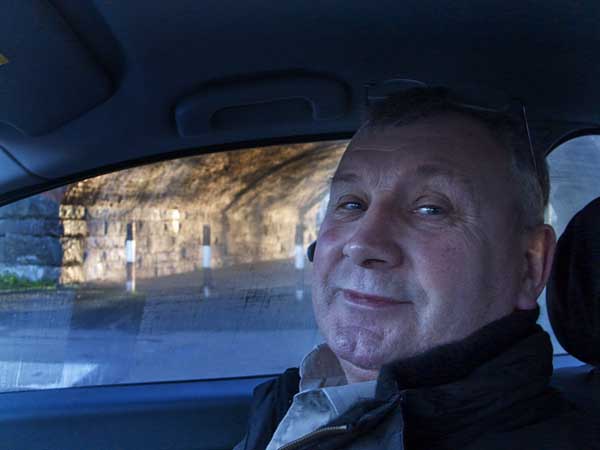 Taxi driver Robert who had worked at Port Glasgow. Ships later taken apart in Chittagong, Bangladesh, started their journey here. December 10 2007. ? Shahidul Alam/Drik/Majority World
Taxi driver Robert who had worked at Port Glasgow. Ships later taken apart in Chittagong, Bangladesh, started their journey here. December 10 2007. ? Shahidul Alam/Drik/Majority World
the Prince Claus Fund Award ceremony in Amsterdam and the conference “Visible Rights” at Harvard, took me from a sunny afternoon in Scotland to the snow covered streets of Cambridge.

Though Jon Husband had helped me setup my blog, I had never met him before. Jeroen picked me up at Schipol, and Jon, Jeroen and I had dinner at the Bazar Middle Eastern restaurant in Amsterdam. December 10. 2007. ? Shahidul Alam/Drik/Majority World
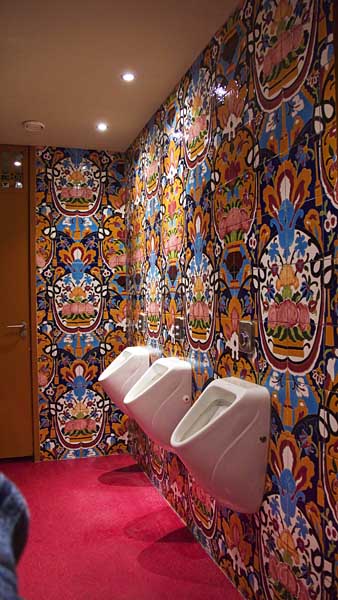 The ornate loo at the Bazar Middle Eastern restaurant in Amsterdam. December 10. 2007. ? Shahidul Alam/Drik/Majority World
The ornate loo at the Bazar Middle Eastern restaurant in Amsterdam. December 10. 2007. ? Shahidul Alam/Drik/Majority World
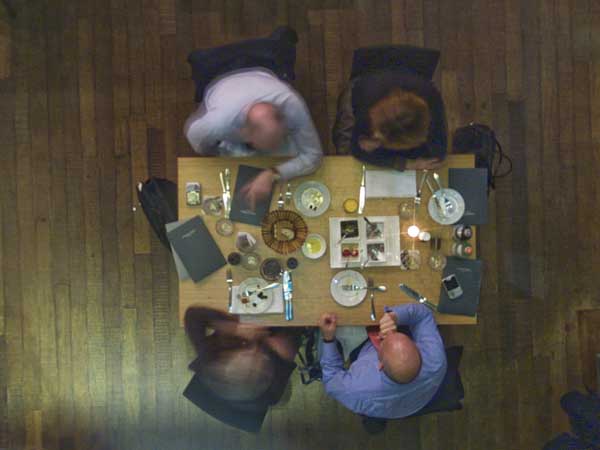 Diners seen through the glass floor at Muziekgebouw. Amsterdam. Dec 12. 2007. ? Shahidul Alam/Drik/Majority World
Diners seen through the glass floor at Muziekgebouw. Amsterdam. Dec 12. 2007. ? Shahidul Alam/Drik/Majority World
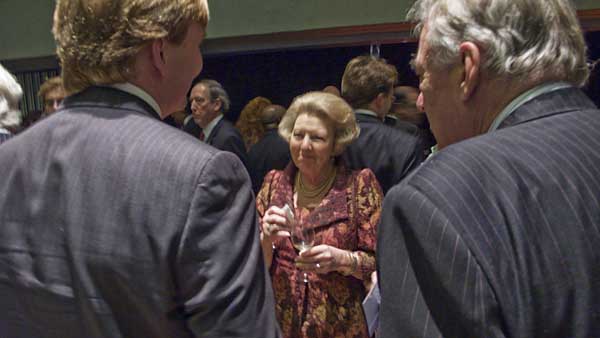 Queen Beatrix at Prince Claus Fund Award Ceremony at Muziekgebouw. Amsterdam. Dec 12. 2007. ? Shahidul Alam/Drik/Majority World
Queen Beatrix at Prince Claus Fund Award Ceremony at Muziekgebouw. Amsterdam. Dec 12. 2007. ? Shahidul Alam/Drik/Majority World
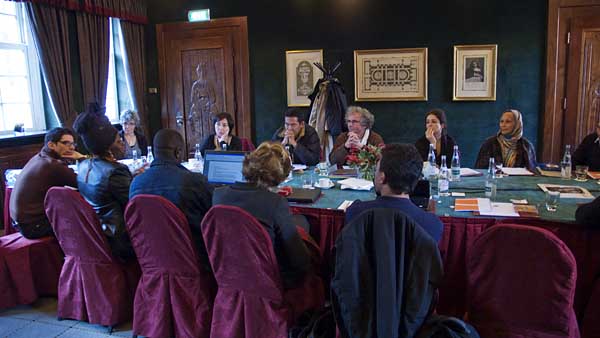 Network meeting of Prince Claus Fund at Grand Hotel, Amsterdam. December 13th 2007. ? Shahidul Alam/Drik/Majority World
Network meeting of Prince Claus Fund at Grand Hotel, Amsterdam. December 13th 2007. ? Shahidul Alam/Drik/Majority World
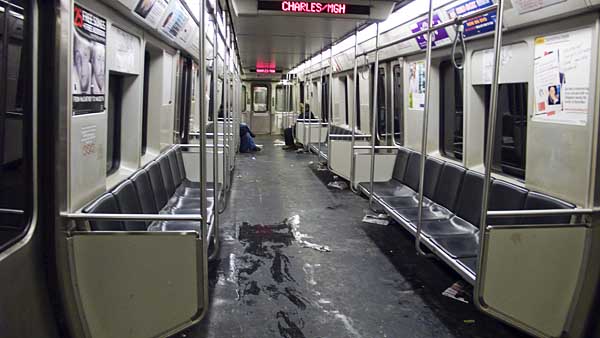 Train at Boston December 14. 2007. ? Shahidul Alam/Drik/Majority World
Train at Boston December 14. 2007. ? Shahidul Alam/Drik/Majority World
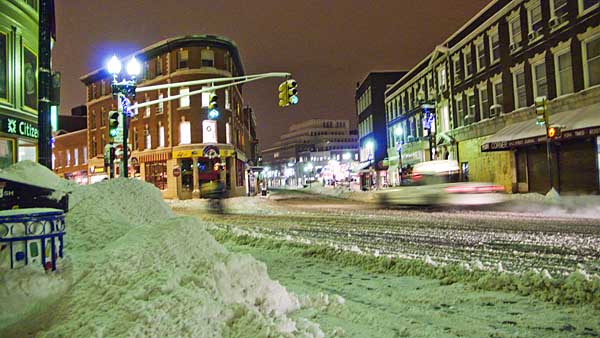 Outside Harvard train station at 2:00 am. December 14. 2007. ? Shahidul Alam/Drik/Majority World
Outside Harvard train station at 2:00 am. December 14. 2007. ? Shahidul Alam/Drik/Majority World
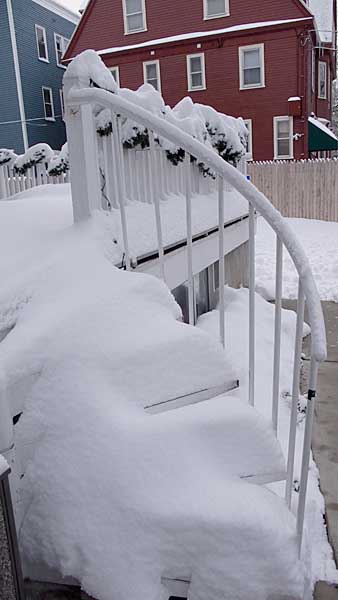 Stairs at Irving House. December 14. 2007. ? Shahidul Alam/Drik/Majority World
Stairs at Irving House. December 14. 2007. ? Shahidul Alam/Drik/Majority World
There was good news in between. The Rajshahi University teachers being released was a great relief, but the deaths of workers at Rangs Building, and the slum fire in Begunbari reminded me how far my own life was from the reality of workers and slum dwellers of my land.
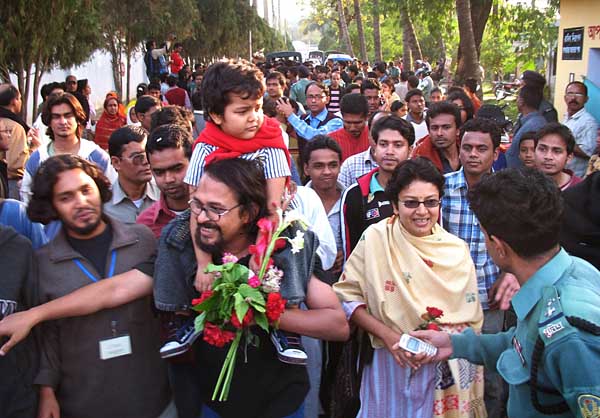 Detained Rajshahi University teachers, released after being granted a presidential pardon. December 10. 2007. ? Iqbal Ahmed/DrikNews
Detained Rajshahi University teachers, released after being granted a presidential pardon. December 10. 2007. ? Iqbal Ahmed/DrikNews
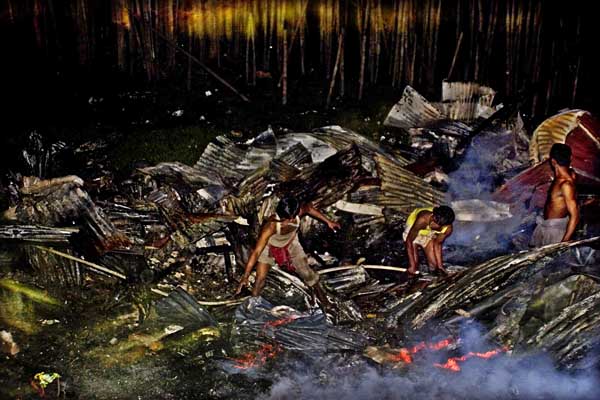 Fire in Begunbari slum. December 15. 2007. ? Zaid Islam/DrikNews
Fire in Begunbari slum. December 15. 2007. ? Zaid Islam/DrikNews
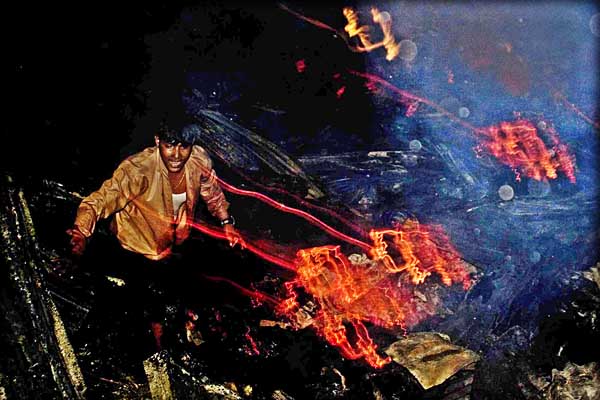 Fire in Begunbari slum. December 15. 2007. ? Zaid Islam/DrikNews
Fire in Begunbari slum. December 15. 2007. ? Zaid Islam/DrikNews
While the gatekeepers who rule our land remain untouched by the death of the poor. While media houses remain in the hands of wealthy business people. While opulent adverts by Grameen, Banglalink and Warid influence what gets reported in mainstream, the lives of media professionals like Priscilla Raj, Tipu Sultan, Probir Shikdar and Tasneem Khalil will continue to be under threat, The war criminals supporting the Pakistan Army had killed our intellectuals on the month of victory in 1971. December has another meaning for the workers and the slum dwellers who live under different military rulers.
The Barren Banana Tree
![]()
Singapore Airlines warned of “protests by university students developing in Dhaka” as we boarded the plane. But emails from Delower and Rahnuma during the brief stopover in Singapore talked of the curfew in place in the six main cities. This was no longer a small skirmish in Dhaka University. Joshim was going to be at the airport with my accreditation card and we would try and find a way back home.

Students at Dhaka University under teargas attack, throwing bricks at police. 22 August 2007. Dhaka Bangladesh ? Munir uz Zaman/DrikNews
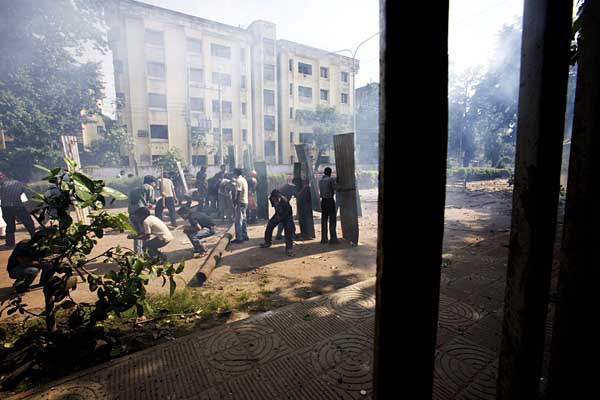
Students at Dhaka University shielding themselves with sheets of tin, during fights with police. Photographer anonymous.
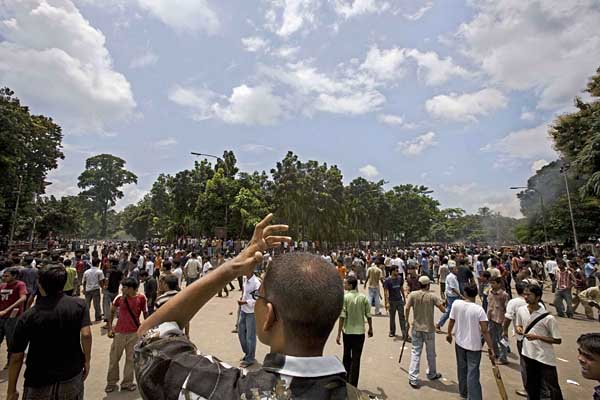
Protesting students gather at Dhaka University campus during violent clashes with police. Photographer anonymous.
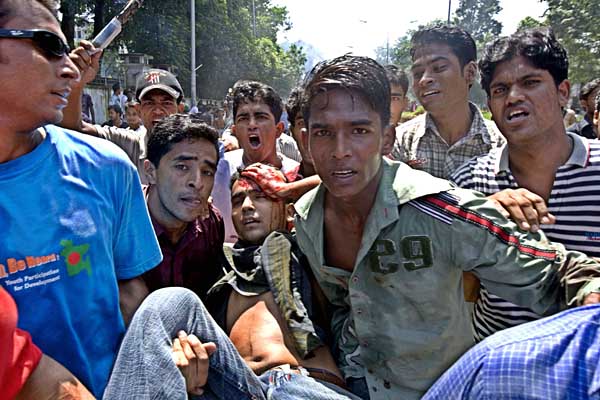
Student hit by police shotgun bullet being carried away by fellow students. Photographer anonymous.
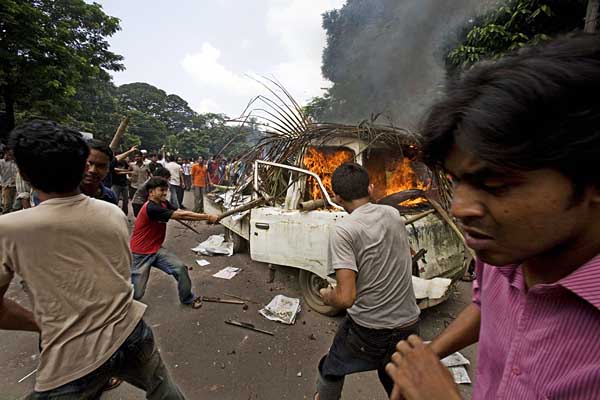
Enraged students burn a car at the Teacher’s Student’s Centre (TSC). Photographer anonymous.
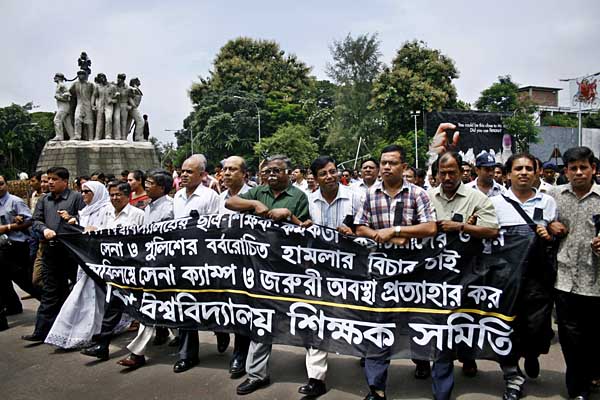
Members of Dhaka University Teacher’s Association protesting against the attacks on campus by police and army, and demanding withdrawal of the state of emergency. Two of the teachers in the front row have since been arrested. 22 August 2007. Dhaka Bangladesh ? Munir uz Zaman/DrikNews
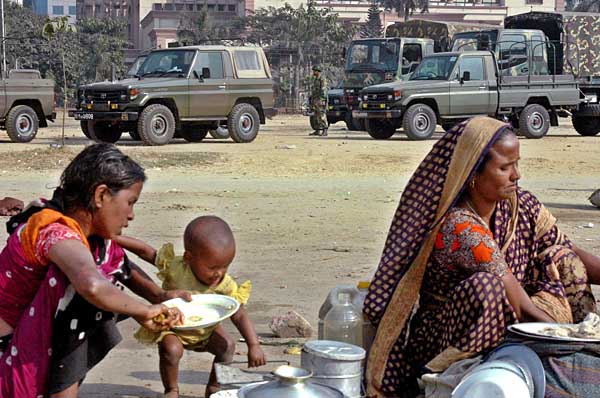
Rocketing prices of essentials create extreme distress for people with low earnings, like the people pictured in the foreground. The military of Bangladesh, which has not had to fight since the birth of the nation in 1971, has in the meanwhile, had increasing budgetary allocations in each successive regime. Numerous allegations about corruption in military purchase, has gone uninvestigated. 22 August 2007. Dhaka Bangladesh ? Munir uz Zaman/DrikNews
The government had taken all mobile networks off the air. With only official press releases for information, the person in the street was in for a rough time. It was easy to find Joshim in the empty car park. Only the occasional long distance truck plied VIP road. I put the video camera on record mode, but relied on my less conspicuous LUMIX to photograph the empty streets. Though I stopped on the Mohakhali flyover to take pictures, I was nervous when the RAB vehicles passed below. There was never a good time for being arrested, but this was as wrong a time as it could get.
Aaasteeey! The policeman strode over lazily. Ki bapar? I did have my card dangling from my neck, and from previous experience, used my confident, ‘I belong here’ approach. That usually worked best with low tier security people.
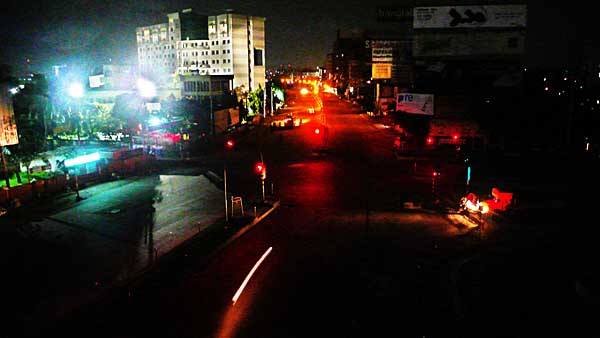
The Mohakhali Junction, one of Dhaka’s busiest traffic spots, is empty on the night of the 22nd August, when the government called an indefinite curfew. Dhaka Bangladesh. ? Shahidul Alam/Drik/MajorityWorld
I’d stopped to take pictures by the near-empty Tejgaon rail station. Stepping carefully through the people sleeping on the floor, I came up to Shahjahan and Neela. Unaware of the curfew, they had brought their sick child Shamim from Tangail, but got stranded in Tejgaon. There was no food, no doctor, no place to sleep, no way of knowing how long this would go on. Each visit to the toilet cost 5 Taka.
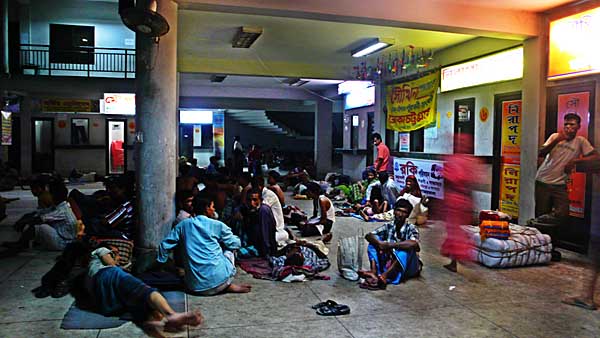
Stranded passengers at Tejgaon Railway Station, sleep on the floor. 22 August 2007. Dhaka Bangladesh. ? Shahidul Alam/Drik/MajorityWorld
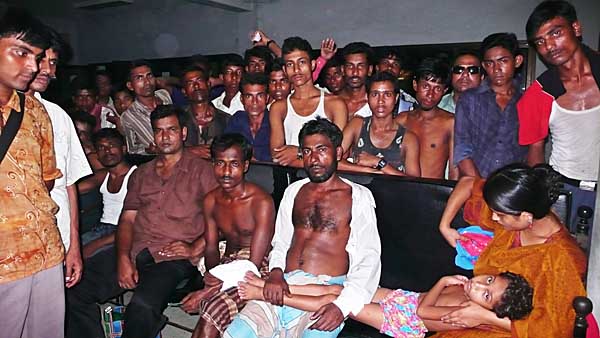
Shahjahan and Neela tend to their sick child Shamim, whom they had brought to Dhaka for treatment. Along with other stranded passengers at Tejgaon Railway Station, the family had no food or drink, or a place to sleep. 22 August 2007. Dhaka Bangladesh. ? Shahidul Alam/Drik/MajorityWorld
The next checkpost was slightly more hostile, but the expired accreditation card dangling from my neck was working overtime. We passed without much harassment. Dropping Joshim home, I went past the Shonar Bangla Market in Karwan Bazaar. The busy market place had a haunted look. No cackle of chickens, haggling for prices, or calls from vendors. Just one man counting loose change.
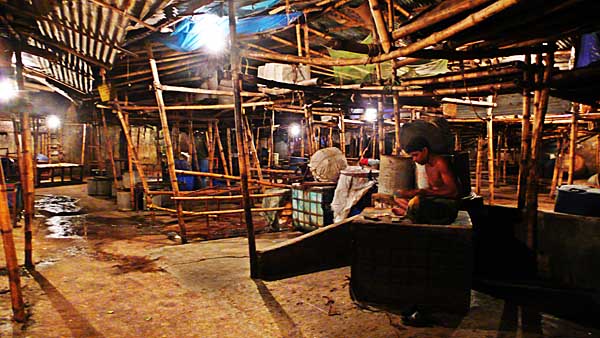
Shonar Bangla Market at Karwan Bazaar is one of the busiest market places in Dhaka. The shops are empty on the night of 22nd August 2007. Dhaka Bangladesh. ? Shahidul Alam/Drik/MajorityWorld
The brightly lit Square Hospital in Panthapath stood out in the dark. Government orders to turn down the lights after dusk to save electricity was presumably for commoners only. The street was empty, but this time as I approached with my camera police converged from all directions. I fumbled a bit, but recovered in time to get one shot. This was not the time to look for best angles. Rattling off important sounding words like ministry of information, and dropping the occasional names I could think of, I got into the car and drove off before the uniformed men had gathered their wits. A government adviser’s business interests in Square Pharmaceuticals – while undeclared – was well known. Students had already attacked the building the previous day. The approaching police knew whose business interests to protect.
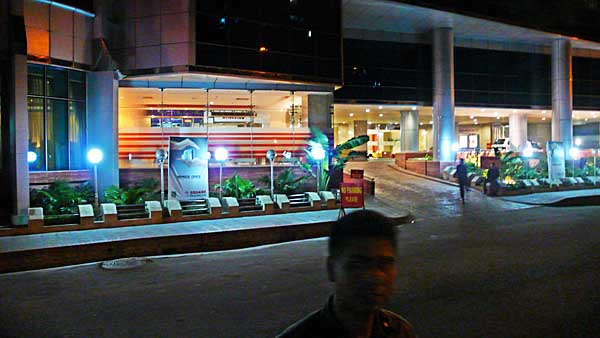
The Square Group, one of the wealthiest business enterprises in Bangladesh owns the Square Hospital. Government regulations prohibit the excess use of electricity and non-essential shops are required to close by 8 pm. Several people were killed by the police when they came out in protest, demanding adequate electricity. The Square Group is owned by the family of one of the advisers of the caretaker government. 22 August 2007. Dhaka Bangladesh. ? Shahidul Alam/Drik/MajorityWorld
The road through Dhanmondi was eerie. The women who walked the streets near Abahani playground were nowhere to be seen. Like the many others who struggled to make a living, they too would not be earning tonight.
The junction near ULAB was scarred by burnt tyres. The convoy of police vans deterred me from getting my camera out and I turned into road 4A. It was time to go home. Kamaler Ma, Joigun, Zohra and Rahnuma were all up waiting. With the mobile network off, they didn’t have any news about me. There must have been others in many more homes who were up worrying.
Rahnuma and I talked of the events over the last two days, of the army camp in Dhaka University. Of a soldier slapping a student. Of the vice chancellor (acting) being beaten up by police. This had never happened before, not even during the Ayub or Ershad military regimes. The reference to ‘evil doers’ in the chief adviser’s speech to the nation was worryingly close to the ‘axis of evil’. Independent media channels were then still defiant. That night the information adviser advised the media to practice ‘self censorship’.
Despite their claims, this government had never been called in by the people. We had no say in who the advisers would be. It was not military rule the people had welcomed, but the cessation of violence and the fear of further anarchy if the rigged elections were held. Banana trees would have made equally good replacements. However, banana trees would not have sold national interests. Closed down environmentally-friendly jute mills. Made slum dwellers homeless, or tortured and killed adibashis protesting the military acquisition of their ancestral lands. So while there was initial relief, as the price of essentials soared, news of nepotism and the partisan manner in which Jamaat -e-Islami was being shielded soon made people realise this banana tree would never bear fruit, let alone run a government.
Warrantless arrests by plainsclothes army under the cover of curfew. Dissenting teachers picked up in the middle of the night. Making threats to independent channels ETV and CSB are hardly the character of a saviour government pledged to the return of democracy. As the behind-the-scene military decides it will now take centre stage. As Bangladeshis realise that a democratically elected autocratic government has simply been replaced by an unelected autocratic one, the tune in the streets is changing.
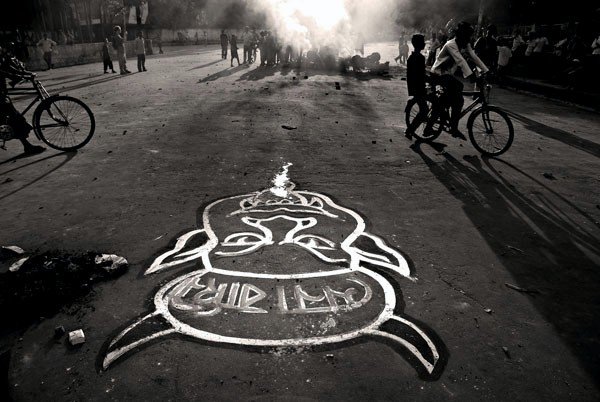
Symbols of fascist oppression drawn on university road. 21st August 2007. Dhaka Bangladesh ? Munem Wasif/DrikNews
Multiple demands of students and teachers have been whittled down to one – withdraw emergency rule. Underground pamphlets are spreading like wildfire. With the Internet down, text messages are filling up the ether. The information adviser’s suave statements to the media faltered as he snapped, “why such a fuss about a slap or two?”
****
The photograph that was being shown here has been removed on the request of the photographer
****
“In unprecedented scenes, soldiers in uniform were seen being chased out of the Dhaka university campus by students. In two days, the myth of the army’s omnipotence was all but laid to rest.” BBC. Photographer Anonymous.
The US has declared support for the chief adviser’s statement. What he lacks is the support of the people.
Flying Decadence
If ever I’d wanted to savour the decadence of flying in a private jet, this was it. The F28 seats 78, less one for the flight engineer. I had the choice seat, 1F, right hand window seat, perfect for viewing the Everest. As it turned out, it didn’t matter too much. There were only four other passengers, and we could have taken any seat we chose, left, right, window, and aisle. Had it been a long flight, I would have sprawled across three seats and snored away.Service was excellent. Captain Enam was a photographer and we had fun talking pictures. Never before have I known each passenger in my flight. No queues on arrival, baggage on the belt, even before we’d arrived. Wonderful. Except of course for Biman or the environment. A conservative estimate of a flight to Kathmandu costs Taka 2 lakh. That’s Taka 40,000 per passenger on flight 703. The enormous environmental damage for ferrying five people to a neighbouring country was staggering.
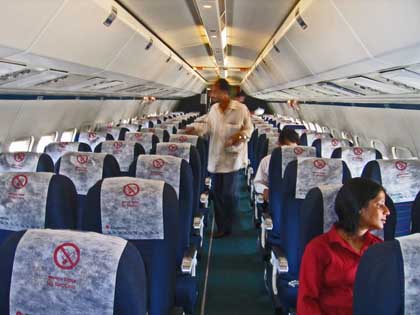
The F28 we were flying was old, water dripped onto the seats, the shuddering panels had withstood daily wear and tear for some 35 years. Still, Bangladesh had paid some nine crore (ninety million) taka for this craft.
I could hear the mumbling in the ground. Cautious comments about how top management never consulted the rest of the staff, how decisions were made on political rather than technical or economic grounds. Rama, a Nepali passenger whose father worked in Cosmic Air commented on how they had expected the flight to be packed because the afternoon flight of Cosmic Air had been cancelled. She was surprised that despite such numbers there were two flights to Kathmandu on the day.
The comments then veered to Biman as a whole. “Amra Borishale batash ani nei” (We only transport air to Barisal and back, there are no passengers), said a Biman official. “Chowdhury shahab er bari Borishale, oi flight ki ar thaman jaibo (Mr Chowdhury the minister- is from Barisal, fat chance you have of stopping those flights).
I enjoyed my flight. I bet the two cockroaches who kept me company did too.
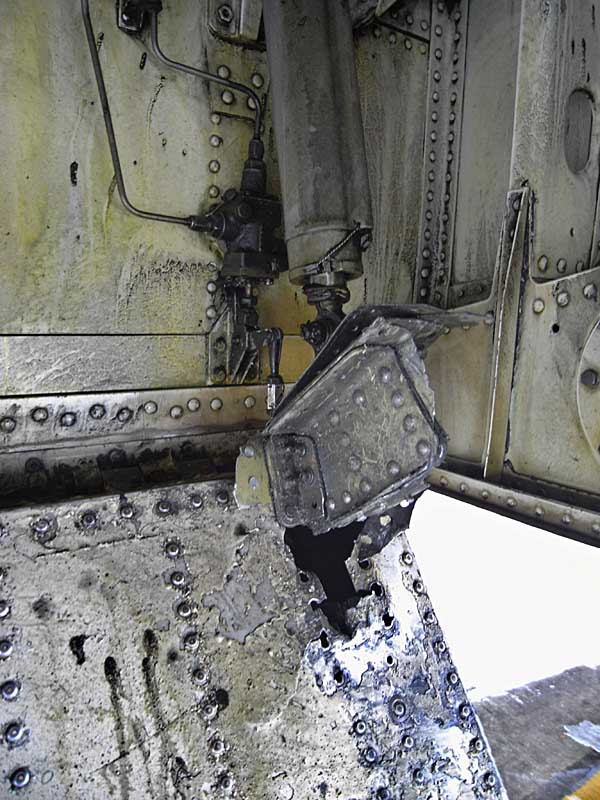
When a Pineapple Rolls
Subscribe to ShahidulNews
![]()
Getting hold of a copy of the banned magazine was difficult, but most of the people who were subscribers seemed to have read the article. As often before, censorship had given the Time Magazine piece a notoriety, and readership appeal, it might not otherwise have had. The ban was short lived, and soon the article had been forgotten.
The Bangladesh government’s treatment of its journalists however had not been so short lived. The Channel 4 journalists were predictably, released well before Christmas. For Saleem Samad, and Priscilla Raj, the situation was considerably different. Tortured and terrorised, they fell victim to a government in permanent fear of being labelled `fundamentalist’. When a pineapple rolls it is the grass that suffers, and post 9/11, it is the small states that have felt the pangs of `terrrorism control’.
The ban of the 28th July 2003 Newsweek issue was based on fears at home. “Repeated bans on international magazines on account of articles on Islam constitute a flagrant violation of the free flow of information,” Reporters Without Borders said in a letter to Bangladeshi information minister Tariqul Islam.
The RSF statement fails to address the wider issue of control on the media. Arranging photo ops, planting questions at press conferences, removing access to the `pool’ for dissenters, spin, corporate control of the media and the newly found ally of embedded journalists are beyond the reach of a government with limited media management skills. Fisk, Chomsky, Pilger, Monbiot et.al. have made valiant attempts to overcome media control in the west. But neither their work, nor the excellent independent analyses that have circulated on the Net, have managed to create a significant challenge to a well-entrenched propaganda machinery. They have largely preached to the converted.
The handling of the Channel 4 incident and the ban on Newsweek by the Bangladesh government were at best clumsy. Buying out the limited copies that are imported for Dhaka’s elite, could have far better stymied the tiny readership to Time and Newsweek in Bangladesh. An “Out of Stock” label has far less glamour than a “Censored” sticker. The harassment of Samad and Raj, was unnecessary. These were ill paid professionals trying to make a living helping foreign journalists.
A flimsy majority that depends upon a small but significant Islamic party, makes things further complicated for the government of Bangladesh. Dissent within has to be managed along with keeping in the good books of powerful states. The earlier Time Magazine article on Al Qaeda links, was tenuous at best, and the Far Eastern Economic Review article on the rise of fundamentalism was shoddy journalism. But when it is so important to say one has been a good boy, any slander, no matter how unbelievable, has to be vehemently denied. Banning the award winning film Matir Moina, (now showing in cinema halls, with only minor amendments) was a knee jerk reaction, symptomatic of a nervous government trying to juggle with appeasement outside and appeasement within.
This is not the first time the Islamic parties (Islami Oikya Jote, IOJ) have played a key role in parliamentary dynamics. Popularity for major parties far exceeds the following of OIJ, a small and disciplined party. Despite their low votes however, they have had a key presence in all governments since the elections in 1991. “We could withdraw from the alliance if the demands are not met,” Mufti Fazlul Huq Amini has threatened at strategic moments, and the government does not want to rock its own boat.
While we may be thankful that the Bangladesh government is not media savvy, the more crude attempts to suppress free journalism doesn’t bode well for media professionals. We have now had three largely free and fair elections, but the elected representatives of the people have hardly behaved in a democratic manner. Each of the three governments have resorted to violent means to ensure loyalty. More recently, warrants of arrests, issued against five editors and one executive editor on defamation charges, within a period of three weeks, represents a shift in strategy. The minister’s statement “Wherever you will find journalists, break their bones,” was really intended for rookies on the streets, and rural journalists. Going for the big boys is a more recent affair.
So how does a nation, scared of big brother, and managing a rickety coalition handle the media? Letting the journalists speak appears to be the most sensible route out. Surely, not all western journalists will be as incompetent as their Times and FEER counterparts. Maybe they themselves, given a more free hand from corporate control, would exercise the journalistic rigour required of them. Strengthening local media would go a long way in providing alternative analysis to western viewpoints. Murdered journalists don’t write too well.
“Not a hair will be touched” the minister had said in 1994, when feminist writer Taslima Nasreen was facing persecution. Not a hair was touched, and Nasreen, still under threat, was provided safe exit to a land of her choosing. In the same July 1994 issue where the NYT covered this story, there was another news, of a US doctor going to work in a bullet-proof vest and being shot in the head. While one tripped over the word fundamentalism in the Nasreen article, religion or fanaticism was never mentioned in the story of the doctor’s death. When journalists regurgitate a state’s values, control is complete. Thankfully, Bangladesh has not reached such levels of state control, and our journalists have not reached such levels of acquiescence.
A responsible media which operates freely, could do wonders for Bangladesh, for its image and its people. But there is a downside to this. A more informed public would be less easily manipulated, corruption would be more difficult, absolute power would be more readily questioned. Government acquiescence in the face of western interests flies against the rhetoric of demands for free press by western states. Secret deals are more easily made in the absence of meddling journalists.
As for terrorism, we would love to see it end. If only the US would stop manufacturing it.
Shahidul Alam
Fri Aug 15, 2003
When Dollars Swim Freely
Subscribe to ShahidulNews
New Internationalist Magazine Issue 332. March 2001
If the billions of dollars in aid to Bangladesh over the last?three decades had been given directly to the poor, it would?have made a major difference to their lives. As it is, the poor?continue to struggle while the rich flaunt their ever-increasing?wealth. Shahidul Alam visits the homes of people?at opposite ends of this great divide.
The guard at the gate hesitates before questioning me. My white friend walks on. Her right to entry is beyond doubt. A cough by someone nearer the door, and higher up in the chain of command, signals my credentials and the hesitant guard makes a smart salute. I?ve been here before. At the gate of the British High Commission or the office of the UN Development Programme, for example. These are places where the?bideshis(foreigners) and the well-to-do Bangladeshis have ready access. My sloppy clothes and the fact that I did not alight from a fancy Mitsubishi Pajero were enough to give my position away. Besides, I walked differently, made eye contact with those outside the chosen circle, and was clearly not supremely confident of my position.
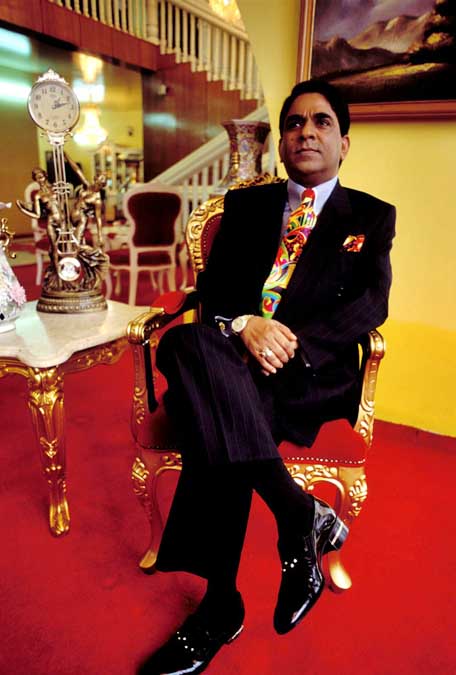
Hasib?s palatial home is in Baridhara, a part of town with the most intriguing architecture. Here Tudor houses rub shoulders with Spanish villas, with the occasional Greek columns thrown in. What are missing are the lavish gardens one might expect. Land is expensive here and homes are often built up to the edge of an individual plot and sometimes even beyond it. Only the very special ones have a patch of green, perhaps a swimming pool.
This is a land of tranquillity. No?hartals (general strikes) affect the normal flow of life. The American International School where Hasib?s children study is perhaps more expensive than the average private school in Britain, but does give his heirs the sort of training needed to blend seamlessly into the high-powered positions they will surely come to occupy. The school holidays prioritize Hallowe?en over Eid. No adulteration of ?higher cultures? by local practices is tolerated here. The one discomfort that the inhabitants face are the slums by the edge of the lake, the hungry stares from across the metal fence, the huts between the palaces, that have not yet been cleared out. The dark glass of the Pajero does reduce contact, but even the air-conditioning doesn?t quite clear the smell.
The interior d?cor of Hasib?s home matches the fantasyland exterior. This is a home appropriate to a wealthy media person whose companies receive funding from UN agencies, who is an agent for a prominent US company in the energy sector, and who is well-connected to all the major political parties. Hasib is not a person you would want as an enemy. The presence at this party of the ?lite of the city, the aid givers and takers, and a sprinkling of ?intellectuals? testifies to his acceptance in the circles that matter. Smiling photographs with former leaders Mujib and Ershad, with the US Ambassador and prominent heads of state, adorn his office, though they are appropriately changed to suit the political clime. Ershad at his most powerful visited Hasib?s office, though he was later to comment jokingly in Parliament on Hasib?s smuggling links.
These are well-travelled people, and all that is best in the world outside is present here. Cut-glass chandeliers in abundance. Leather-bound classics neatly arranged in teak shelves. Expensive paintings, mostly by artists who have died, but also by Shahabuddin, the current?enfant terrible, hang in gilded frames.
The well-dressed waiter snakes through the crowd distributing wine, beer and whisky, technically illegal in Muslim Bangladesh. This is a place for men of the world and emancipated women.
Nadia, Hasib?s wife, tosses her hair back in her revealing dress as she laughs with the US Ambassador. She gently acknowledges the minister as he walks by, excusing herself to talk to the editor of the most popular daily. She looks out for the World Bank chief, and relaxes as she spots him out by the swimming pool, talking to the head of the largest NGO. She only wishes she didn?t have to invite the MP who was found making bombs in his house. Such people give others a bad name.
The MP was a minor embarrassment to the ruling political party, especially as it had just embarked on a clean-up campaign. Fourteen-year-old Rimon was at the other end of the spectrum. He was one of several young men arrested when they were trying to make the clean-up campaign look good. They had to plant a knife in his hand in order to make the arrest. He had no previous record and the witnesses all denied in court that they had seen Rimon with weapons, but these were not insuperable problems. The fact that he was a minor was, on the other hand, a technicality that might have proved awkward. Fortunately he was too poor to make an issue out of being under- age or about being kept in jail for two years without a trial.
One could look at it as a democratic process. The system doesn?t really care about class, race or gender. If one has money, one stays out of jail. Without money, one stays in. Rimon?s mother Fatema works seven days a week as a domestic help in the home of a top civil servant. Low-paid and with no benefits, she has had to borrow over 20 times her monthly salary to try to get a fair trial for her son. The process of trying to bribe judges, paying high fees to lawyers and regularly paying the police is something she seems to have accepted. Her biggest sorrow is that the food she buys for her son doesn?t always get through to him, despite the bribes she pays to the wardens. ?I used to serve food in four plates for my children. Now I serve only three. The pain burns within me every day.?
The justice you are likely to get is directly linked to the money you are able to muster. Hasib was suspected of smuggling gold, but no-one made too much of his going scot-free on that count. Now Hasib is into bigger things. An agent for a leading US gas company, his other hat as a major media baron comes in handy. Press releases by the US gas companies appear dressed up as news reports.
He has even ?written? a book. The senior professor and the archeologist who ghost-wrote it do not seem too perturbed by the mismatch between the book?s content and the official author?s credibility as a writer. At the press launch, leading?litt?rateurs talked of the talent of the man, his contribution to society.
Rimon never even went to school. Long before his body had fully matured, he was pulling a rickshaw, helping to support the schooling of his two sisters and younger brother. Ironically, on a per-square-metre basis, his mother Fatema pays more rent for her shack than the standard rental in wealthy Baridhara. In many slums, access to water is a privilege you pay for separately. Sanitation, electricity and other amenities are all extras.
Being important vote banks, slums are controlled by local strongmen with affiliations to the major political parties. Fires rage through them on a regular basis: sceptics claim that this is a convenient way to evict unwanted residents. Sometimes fires precede a sell-out to developers.
At least Fatema has a roof of her own. More vulnerable are the domestic servants who live in their employers? homes. Many of them are children or young women. Murder, rape and inhuman torture are commonly reported. A far greater number go unreported.
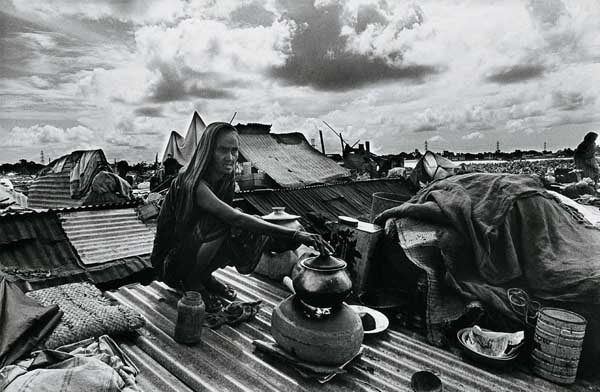
The slums are the entry points for the millions who converge upon the metropolis from the villages in search of work. In the countryside the divide between rich and poor is similarly reinforced by foreign money.
Wasim Ali, a wealthy shrimp farmer in Khulna, goes around in a gunboat warding off and occasionally killing trespassers. His guard points out the shrimps, saying ?dollars swim in the water?. The World Bank assists Wasim and others in setting up shrimp-processing units and Japan buys much of the shrimp.
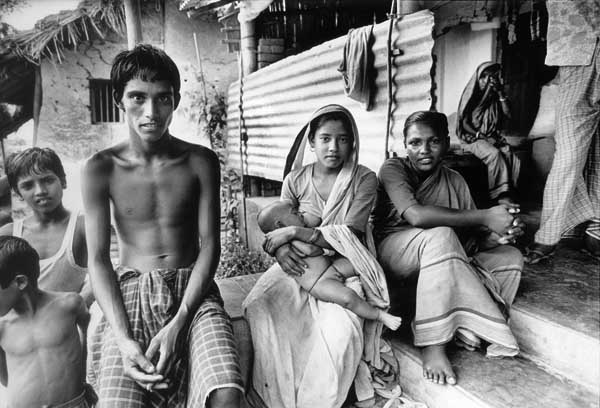
Lokhi Pal?s family, who used to grow paddy, were forced into selling their land to Wasim once the entire area became salinated due to the new embankments that had been built. ?We had cows and a vegetable patch,? she told me. ?All we needed to buy was oil and clothes.? Now they go during?hat (the weekly market day) to a neighbouring village to stock up on food and basic supplies once a week. The family eats well for the first three days then hangs on till the next hat day. Still attached to their cow, they send it off to a nearby village to graze but have to pay for the privilege.
Back in the city Fatema worries about her son?s health, about the money she will somehow have to repay. She worries most that unless she finds some way to get her son out of prison he will soon end up embittered. Then when he does come out he could be forced to do the kind of thing for which he could be arrested again. Right now, however, she longs to have an extra mouth to feed. For Hasib and Wasim, of course, the dollars continue to swim freely.
——————————————————-
The feature is based on facts, but the names have been altered.
New Internationalist Magazine Issue 332, March 2001.
The issue was co-edited by Shahidul Alam and the NI editorial team.
